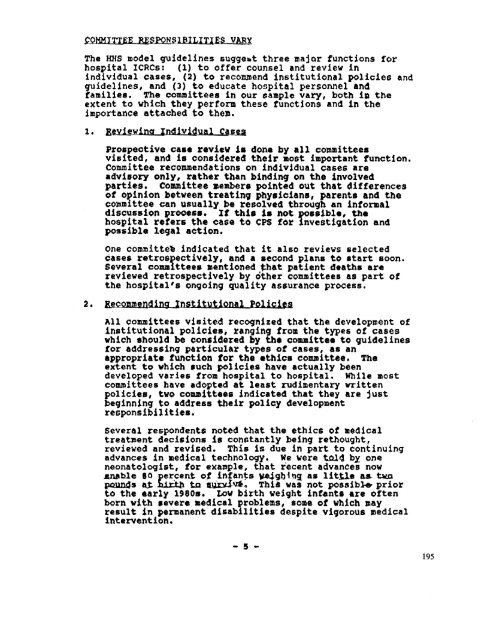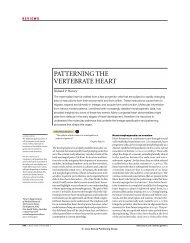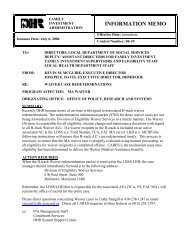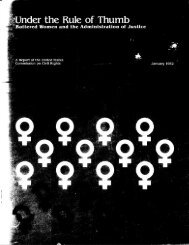- Page 1 and 2:
MedicalDiscriminationAgainstChildre
- Page 3 and 4:
idments • Section 504 • Medical
- Page 5:
LETTER OF TRANSMITTALThe PresidentT
- Page 9 and 10:
CONTENTSExecutive Summary 11. Funda
- Page 11:
12. The Performance of the Federal
- Page 14 and 15:
• The role of economic considerat
- Page 16 and 17:
disabilities at the time that the c
- Page 19 and 20:
generated by health care personnel
- Page 21:
ing how they would obtain medical r
- Page 24 and 25:
The Commission sees several advanta
- Page 26 and 27:
acquiescence in the death or elimin
- Page 28 and 29:
Services of the Department of Healt
- Page 30 and 31:
Chapter 1Fundamental Rights: An Int
- Page 32 and 33:
Carlton Johnson was evaluated by a
- Page 34 and 35:
"that Mr. and Mrs. Doe, after havin
- Page 36 and 37:
American Coalition of Citizens with
- Page 38 and 39:
Chapter 2The Physician-Parent Relat
- Page 40 and 41:
In all but a few cases, the parents
- Page 42 and 43:
the family, and the family went alo
- Page 44 and 45:
Chapter 3The Role of Quality of Lif
- Page 47:
transition from education to employ
- Page 50 and 51:
tion programs can become productive
- Page 52 and 53:
unsuccessful efforts of a private a
- Page 54 and 55:
[S]ince I have been at Children's M
- Page 56 and 57:
Another survey by Siperstein, Wolra
- Page 58 and 59:
of life with a child who is disable
- Page 60 and 61:
Chapter 4The Role of Economic Consi
- Page 62 and 63:
©TABLE 4.1Pediatricians' Responses
- Page 64 and 65:
• The differences in average cost
- Page 66 and 67:
FIGURE 4.1Comparative Costs of Inst
- Page 68 and 69:
Chapter 5State LawWhat is the law g
- Page 70 and 71:
Like all authority. . .parental aut
- Page 72 and 73:
This decision, however, was promptl
- Page 74 and 75:
No otherwise qualified handicapped
- Page 76 and 77:
Bloomington's Infant Doe in April 1
- Page 78 and 79:
ONONTABLE 6.1Physician's assessment
- Page 80 and 81:
Essentially, HHS interpreted the su
- Page 82 and 83:
Final 504 RuleHHS received nearly 1
- Page 84 and 85:
lifesaving operations to close her
- Page 86 and 87:
any further implementation of the F
- Page 88 and 89:
handicapped infants might violate S
- Page 90 and 91:
the provision does cover discrimina
- Page 92 and 93:
of the infants. The review mechanis
- Page 94 and 95:
Under the law, the Department of He
- Page 96 and 97:
that "the phrase 'or holds the reas
- Page 98 and 99:
allows an infant to be denied nutri
- Page 100 and 101:
avoid the explicit standards set fo
- Page 102 and 103:
(as opposed to the far) future, the
- Page 104 and 105:
It was recognized, therefore, that
- Page 106 and 107:
als with the particular disability
- Page 108 and 109:
cared for. They are thus different,
- Page 110 and 111:
medical advice. Given the magnitude
- Page 112 and 113:
tions at all regarding the subject
- Page 114 and 115:
strates that there is a grave dange
- Page 116 and 117:
Disincentives to Whistle BlowingDen
- Page 118 and 119:
Using a cumulative scaling procedur
- Page 120 and 121:
Of that 300 we targeted, approximat
- Page 122 and 123:
Conclusionphysicians set forth in t
- Page 124 and 125:
taking place when a report of suspe
- Page 126 and 127:
where the parents say "the child fe
- Page 128 and 129:
Nevertheless, the organization oppo
- Page 130 and 131:
Chapter 11The Role and Performance
- Page 132 and 133:
a member of the American Academy of
- Page 134 and 135:
possibilities that "will be most li
- Page 136 and 137:
clearly indicate that the committee
- Page 138 and 139:
Reviewing the first 30 months of th
- Page 140 and 141:
Webster's defines "suspected" as "t
- Page 142 and 143:
Chapter 12The Performance of the Fe
- Page 144 and 145:
The baby's doctor, E. Laurence Hode
- Page 146 and 147:
to achieve a reasonable life". . .w
- Page 148 and 149:
an unmarried mother receiving welfa
- Page 150 and 151:
can be sure all appropriate actions
- Page 152 and 153:
inquiries to determine whether they
- Page 154 and 155:
Chapter 13The Protection and Advoca
- Page 156 and 157: authority to conduct retrospective
- Page 158 and 159: facility that uses such a committee
- Page 160 and 161: Chapter 14Findings and Recommendati
- Page 162 and 163: as the coordination and development
- Page 164 and 165: in the advisory process who is conc
- Page 166 and 167: A Dissenting View on the Report Med
- Page 168 and 169: arts) to depend upon knowledge of h
- Page 170 and 171: Attachments to Statement of William
- Page 172 and 173: medical facility. Considerations su
- Page 174 and 175: Fund for the Improvement of Postsec
- Page 176 and 177: eports such as Kopelman et al. demo
- Page 178 and 179: Appendix 1EXPOSING OUR CHILDREN, EX
- Page 180 and 181: abilities or functions, they are de
- Page 182 and 183: My principal reason for objecting t
- Page 184 and 185: I derive this hint from the many co
- Page 186 and 187: moral distinction. A girl is a huma
- Page 188 and 189: Appendix 2SURVEY OFSTATE BABY DOE P
- Page 190 and 191: insure the immediate referral of po
- Page 192 and 193: Hospital Liaisons Designated in Mos
- Page 194 and 195: BABY DOE COMPARED WITH REGULAR CPS
- Page 196 and 197: We also asked state CPS offices wha
- Page 198 and 199: Limited information was available o
- Page 200 and 201: one-quarter felt that baby doe case
- Page 202 and 203: Appendix 3INFANT CARE REVIEW COMMIT
- Page 204 and 205: and guidelines concerning the withh
- Page 208 and 209: 3. Educating Staff and FamiliesThre
- Page 210 and 211: One of the 10 ethics committees vis
- Page 212 and 213: asphyxiation during the birth proce
- Page 214 and 215: Prospective Review -- Each committe
- Page 216 and 217: OBSERVATIONSThe inspection found th
- Page 218 and 219: May 1, 1989Page 2The Commission adv
- Page 220 and 221: Doe 1 admitted on the record of the
- Page 222 and 223: tion is the basis for failure to tr
- Page 224: her (much appreciated) vote for thi
















